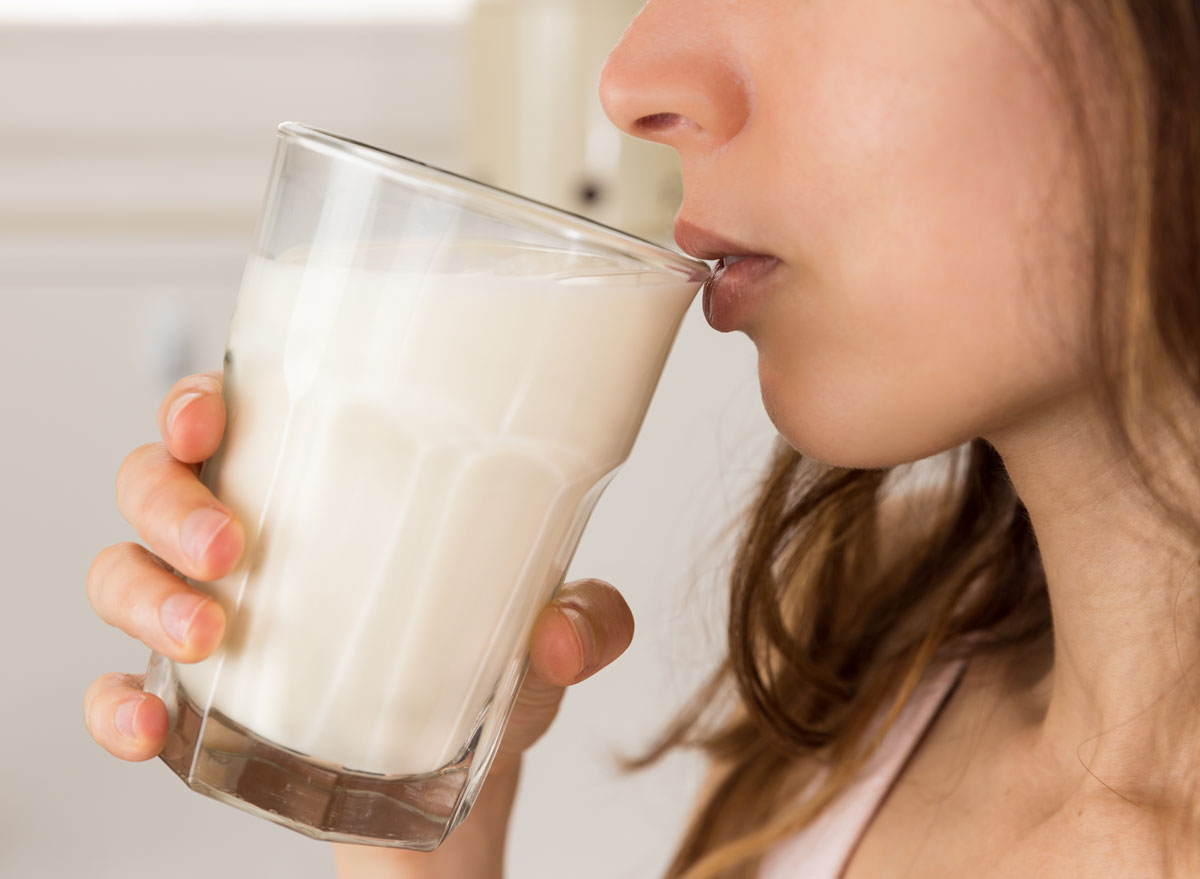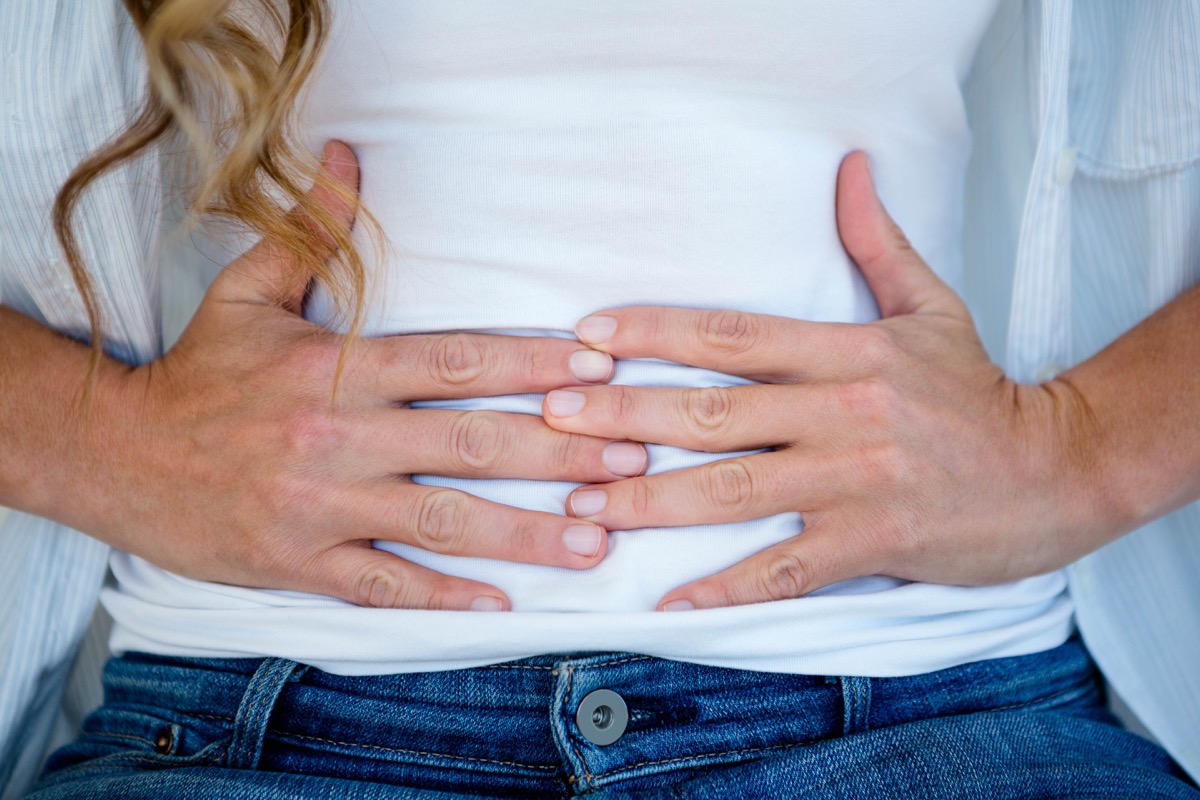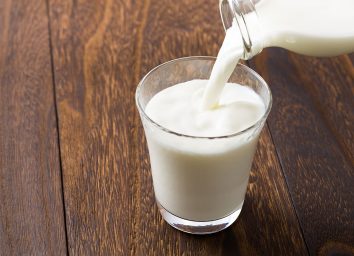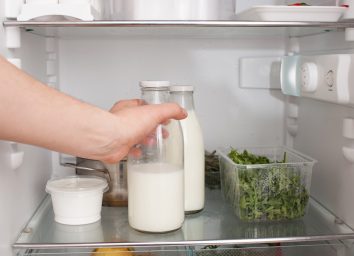Side Effects of Drinking Too Much Milk, According to Science

Despite the prevalence of milk alternatives, dairy milk is still a popular beverage in Americans’ fridges.
On average, American adults consume three-quarters of a cup of milk per day and drink 17.3 gallons of milk per year.
If you look at milk’s nutritional profile, there’s no denying that it’s a well-balanced, healthy drink. Milk (that is both vitamin A and D fortified) makes a significant contribution to the U.S. population’s protein and micronutrient intakes, including 7% daily value (DV) magnesium, 10% DV of potassium and zinc, 15% DV of vitamin D and phosphorus, 20% DV of calcium and vitamin A, 40% DV riboflavin, and 50% DV vitamin B12 per one-cup serving. Most notably, three of these nutrients are considered to be shortfall nutrients: nutrients that are under-consumed relative to the estimated average requirement.
While milk is an excellent source of many nutrients, it does come with some drawbacks if you consume the animal protein in higher-than-recommended amounts, which is about 3 servings per day.
We combed through dozens of studies to determine exactly how your body will react to drinking too much milk. Read on, and for more on healthy eating, don’t miss 7 Healthiest Foods to Eat Right Now.
You may experience serious digestive issues.

A staggering 65% of adults have a lactose intolerance, according to the National Institutes of Health (NIH). While we all love our ice cream, cheese, and milk, do we really want to eat and drink these dairy beverages in the face of our body actively warning us not to?
Lactose intolerance happens when the body produces less lactase as we age; lactase is the enzyme that breaks down lactose. If individuals with lactose intolerance consume lactose-containing dairy products, they may experience abdominal pain, bloating, flatulence, nausea, and diarrhea beginning 30 minutes to 2 hours later, according to the NIH.
You may burden your heart.

According to a BMJ study, drinking too much milk was linked to an increased risk of cardiovascular disease (CVD) and cancer in women. Specifically, the researchers found that women who drank three glasses of milk or more every day had a nearly doubled risk of death and cardiovascular disease, compared to women who drank less than one glass per day. Additionally, a study published in The Journal of Nutrition found that eating dairy foods increased levels of a compound that’s inversely associated with survival of CVD.
You may shorten your lifespan.

In the same BMJ study, drinking too much milk was also related to an increased risk of death and in men and women. Women who consumed three or more glasses of milk per day doubled their risk of death compared to women who drank less than one glass per day. Men increased their risk of early death by about 10 percent when they drank three or more glasses of milk daily. (Related: 20 Signs Your Diet Is Shortening Your Lifespan, According to Science)
You’ll support muscle growth.

Protein helps promote satiety in addition to helping maintain lean muscle mass, and milk has 8 grams of protein per serving. According to a Medicine & Science in Sports & Exercise study, when volunteers drank 1.5 cups of whole milk after leg exercises, their bodies were better able to uptake two amino acids—phenylalanine and threonine—which were representative of net muscle protein synthesis.
You’ll support bone health.

One glass of milk contains 20% DV of highly bioactive calcium, a mineral essential for bone growth and health. By bioactive, we mean that your body can absorb more of the calcium in milk by volume than it can with other sources of calcium. Studies show that calcium-rich dairy milk, which is also high in other minerals (phosphorus, vitamins, iodine, proteins, and potassium) is beneficial for skeleton growth and bone strength. One review published in Aging Clinical and Experimental Research noted that while some studies have shown an increased risk of hip fractures in subjects drinking higher quantities of milk, experts believe there are no proven effects of milk consumption on the risk of hip fractures and that these results were due to methodological issues and recall bias. If you do want to switch your calcium source, you can check out these 20 Best Calcium-Rich Foods That Aren’t Dairy.








